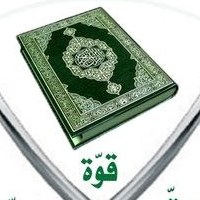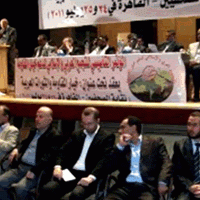![]()
January 2012
This study updates and supplements the ITIC’s June 2011 study of the Muslim Brotherhood. It examines the Muslim Brotherhood in Egypt and other Arab countries in the wake of the past year’s regional uprisings. It deals with the nature of the movement in each country, its relations with the various regimes and evaluates its chances of exploiting regional unrest to its own ends. It also examines the Muslim Brotherhood’s branches in Western European countries and the implications of its activity for both internal European affairs and the Palestinian-Israeli conflict.
Overview
The Muslim Brotherhood in Sudan[26] has a strong social, organizational and political foundation. The Sudanese branch has remained independent from the Egyptian Muslim Brotherhood, with a unique Sudanese version of the Muslim Brotherhood’s ideology and political conduct. For several decades the Muslim Brotherhood in Sudan has taken an active role in the country’s political life, both within the parliament and in support of the coups staged by Jaafar Nimeiri and Omar al-Bashir. Its involvement occasionally gave the movement power to influence Sudan’s regimes and the officers who led the revolutions. However, due to political changes in Sudan and in the region at other times, the movement lost its influence, faced persecution from the authorities and saw its leaders imprisoned for lengthy sentences.
Milestones in the Movement’s History in Sudan
The Muslim Brotherhood in Sudan has a long history. Bordering Egypt and affected by Egyptian politics, Sudan was influenced by the establishment of the Muslim Brotherhood in Egypt. Many Sudanese students studying in Egypt in the 1940s were exposed to the movement’s ideology and organized into networks in universities, forming the nucleus of the Muslim Brotherhood in Sudan.
In 1946 Jamal al-Din al-Sanhuri and Sadiq Abdallah Abd al-Majid were sent to Sudan by the Egyptian Muslim Brotherhood to recruit members, establishing branches in several peripheral towns between 1947 and 1949. However, the Muslim Brotherhood in Sudan was subsequently prohibited from acting openly unless it declared independence from the Egyptian movement, which at that time was illegal. Another founding member of the Sudanese movement was Al-Sa’im Muhammad Ibrahim, a former teacher who in 1947 founded the Islamic Liberation Movement (ILM), whose stated objective was to combat Communism. The early adherents of the ILM came mostly from the rural areas of northern Sudan, where the predominant faith was the Sufi school of Sunni Islam.[27]
The Sudanese branch of the Muslim Brotherhood was officially founded on August 21, 1954. It was headed by Al-Rashid al-Tahir, one of the most prominent leaders of the Sudanese student group exposed to the Muslim Brotherhood ideology in the 1940s. Al-Tahir, who later became the general guide, established close relations with the Free Officers in Egypt, especially with their representative in Sudan. When the Egyptian authorities turned against their own Muslim Brotherhood, the movement in Sudan cut off its ties with the Egyptian movement and joined the political forces advocating Sudan’s independence.
After the 1958 military coup led by Gen. Ibrahim Abboud, the army’s commander-in-chief, the Muslim Brotherhood was allowed to continue its activities as a religious movement, while all other political parties were banned. On November 9, 1959 Al-Rashid al-Tahir plotted to overthrow the regime with the help of an illegal cell within the army, composed of Muslim Brotherhood supporters, Communist activists and others. The plot was exposed, the conspirators were arrested, and the Muslim Brotherhood lost the support of the army and its freedom to act in Sudan.
A revolution in October 1964 toppled Gen. Ibrahim Abboud’s regime and facilitated the establishment of a national unity government. In 1964 Abdallah Hassan al-Turabi and several leading Muslim Brotherhood activists returned to Sudan from their studies abroad. Al-Turabi, who joined the movement while a student at Khartoum University, had completed his studies in London and Paris and was offered a teaching post at the university. He emerged as an important spokesman for the movement and later became its leader. Most of the mass demonstrations organized at the time which ultimately led to Gen. Ibrahim Abboud’s downfall were led by Muslim Brotherhood activists in the university. Compared to the Communists, however, the movement suffered from certain disadvantages within the intelligentsia. In 1965 it therefore founded a party called the Islamic Charter Front (ICF), with Al-Turabi as secretary general. The party was a convenient platform for Al-Turabi to promote the Islamization of Sudan’s elites and occupy positions of political influence.
Between 1965 and 68 the ICF cooperated with Al-Sadiq al-Mahdi’s wing of the Ummah party[28] in its anti-Communist drive and to promote religious legislation. The Muslim Brotherhood allied with other parties and in 1965 succeeded in having the Communist party outlawed. The ICF drew up a religious constitution which was not implemented owing to the officers’ coup in May 1969, led by Jaafar al-Nimeiri and his Communist allies. Following the coup, some of the Muslim Brotherhood’s leaders, including Al-Turabi, were arrested; others fled to Egypt and other countries.
Al-Nimeiri suppressed his opponents, including the Muslim Brotherhood. However, after an unsuccessful coup in 1971, Nimeiri removed the Communists and pursued a rapprochement with the Muslim Brotherhood. In July 1971 Al-Turabi met with Nimeiri and received permission to resume the movement’s activities in Sudan. In 1972 the Students Unity Front, the Muslim Brotherhood’s new organization, took control of the Students Union of Khartoum University. In those years Al-Turabi concentrated his efforts on restructuring the movement with those who had supported him in the 1960s. After another abortive anti-Nimeiri coup in July 1976, the Sudanese Muslim Brotherhood founded a new party, the National Islamic Front (NIF), and became integrated into Sudan’s political system. Al-Rashid al-Tahir, the leader of the Sudanese branch of the Muslim Brotherhood, was appointed vice president and prime minister in 1976.
The elites appointed by Al-Turabi filled the void left by the Communists in the administrative and military leadership, and occupied key political positions. Shortly thereafter, in 1983 Nimeiri imposed Shari’ah — Islamic religious law — as state law. His decision sparked a rebellion in southern Sudan led by Col. John Garang, leader of the Sudan People’s Liberation Army (SPLA), and a bloody civil war ensued.[29]
The Muslim Brotherhood gained considerable political power in Sudan in the 1980s and the first half of the 1990s. In 1979 Hassan al-Turabi was appointed attorney general and many of his followers were given senior government positions. The NIF party became better organized and was successful in the 1986 elections, becoming the third largest party. The NIF’s success was partly due to its financial resources, as in the 1970s it had gained control of Sudan’s Islamic banking system using its connections with Saudi Arabia. The establishment of the Faysal Islamic Bank in 1978 enabled the Muslim Brotherhood to infiltrate the Sudanese financial system and gain power, assets and popularity with the population.
The strong resistance of the Christian population of southern Sudan to the enforcement of Islamic law (Shari’ah) motivated the government to launch peace talks with it. The talks led to an agreement according to which Shari’ah would not apply to residents of the south as of June 30, 1989. On that day, Gen. Omar Suleiman al-Bashir, with the support of Islamic officers influenced by Al-Turabi, seized power by force. The new regime began enforcing an Islamic policy inspired by Al-Turabi.[30] At the same time, the regime launched a cleansing campaign in the army and the administration, accompanied by executions and torture.[31]
In the first half of the 1990s the NIF consolidated its control of the banks, building industry, transportation and media. In 1996, for the first time since the military coup, elections were held in Sudan. Al-Turabi won a seat in the National Assembly and was appointed its speaker. The influence of the Muslim Brotherhood, and of Al-Turabi himself, greatly increased through the presence of Osama Bin Laden, who had moved to Sudan. He met Al-Turabi on several occasions in late 1989 and decided to transfer Al-Qaeda headquarters from Afghanistan (where it was under pressure from the Soviets) to Sudan (now under a regime which had adopted an Islamic orientation). In addition, Bin Laden cemented a personal bond with Al-Turabi by marrying his niece, and in return Al-Turabi arranged for Bin Laden to import construction equipment and vehicles customs-free.[32]
Once in Sudan, Osama Bin Laden, with a group of veterans of Afghanistan who had come with him, established an economic empire. It included leather factories, construction companies, a bank, farms, and import-export ventures. The extensive economic network provided him and his associates with sources of income to finance their subversive and terrorist activities in various conflict zones around the globe (Somalia, Bosnia, Kosovo, Chechnya, etc.). His stay in Sudan came to an end in May 1996 when he was forced to leave Sudan and return to Afghanistan.[33]
In the 1990s, in addition to involvement with Al-Qaeda, Al-Turabi formed close relations with radical Islamic and terrorist elements. He established ties with the Islamic regime in Iran, as well as with the PLO and Hamas, which had offices in Khartoum (the relationship came to an end in 1993, when Israel and the PLO started negotiations in Oslo).[34] In 1991 Al-Turabi launched the annual Popular Arab and Islamic Conference for Muslim groups from across the globe. Participants in the conference included terrorist organizations such as Hamas, the Palestinian Islamic Jihad, Hezbollah, etc. He also received visits from operatives belonging to Abu Nidal’s terrorist organization and Hezbollah, as well as terrorist Ilich Ramírez Sánchez from Venezuela, aka Carlos. In 1995 Al-Turabi signed a statement expressing support and solidarity with Hamas, which was printed in the Londonbased Al-Hayat, according to which jihad was the only legitimate alternative the Palestinians had for the liberation of Palestine.[35]
However, Hassan al-Turabi, who hosted Carlos in Sudan, had no qualms about making a deal to hand him over to the French in return for several million dollars, which he received through a French bank (and which Sudan used to pay its debt to the International Monetary Fund).[36] According to Al-Turabi, he asked Carlos to leave Sudan as quickly as possible, and when he refused he handed him over to France. Interviewed by the Washington Post on May 3, 1995, he said that Carlos was not a Muslim, and therefore extraditing him to France did not pose a moral problem. France, for its part, provided Al-Turabi’s party (NIF) with weapons and satellite photos of the rebel bases in southern Sudan (according to an interview with a senior French officer, August 14, 2002).[37]
The growing strength of Al-Qaeda in Sudan, as well as Al-Turabi’s drift into extremism and his ties with terrorist networks, led to external pressure on the Sudanese regime and internal conflicts within the regime itself. On the domestic scene, a split emerged within the intelligence services as well as between the army and the NIF, as a result of which the army once again assumed control of the intelligence services. On the foreign scene, pressure exerted by Egypt, the United States and Saudi Arabia, concerned about the radicalization on Sudan’s internal situation, prompted President Bashir to cut off his relations with Osama Bin Laden and Al-Qaeda and to expel them from Sudan.
In the late 1990s internal changes and external pressure signaled the end of the influence of Al-Turabi and his party. In 1999 Al-Turabi was imprisoned on charges of conspiracy; he was arrested two years later under the pretext of trying to limit Bashir’s powers. He was released in October 2003, but served another prison term from March 2004 to June 2005. He was detained once again in 2008, but was questioned and released without charges. In January 2009 Turabi was among those who called on Omar al-Bashir to surrender himself to the international tribunal for war crimes in Darfur. Immediately afterwards he was detained for two months and kept in isolation. He served yet another prison sentence from May to July 2010. In January 2011, as instability in Sudan increased, he was detained once again.
In 2008 Dr. Al-Hibir Yusuf Nour al-Dayyim was appointed the general guide of the Muslim Brotherhood in Sudan. Al-Dayyim has a PhD from the University of Edinburgh, Scotland. He chaired the Education Committee of the Sudanese parliament and was head of the Department of Arabic Language at Khartoum University.[38]

General Guide Al-Dayyim gives a speech during the 2010 election campaign (Sudanese Muslim Brotherhood website)
Abdallah Hassan al-Turabi: Profile
Abdallah Hassan al-Turabi, born 1932, is a Sunni cleric who imposed Shari’ah law in many parts of Sudan. His father was a Sufi sheikh in the city of Kassala, in northeast Sudan. As a child, he received a traditional Islamic education. He studied law in Khartoum and at Oxford, and received his PhD in law from the Sorbonne. In the early 1950s he was one of the founding members of the Sudanese branch of the Muslim Brotherhood. He headed the movement in Sudan and was its general guide from 1964 to 1967 and from 1969 to 1979.[39] He later became the most prominent Muslim Brotherhood figure.
Al-Turabi is a pragmatist. His ideological view advocates the renewal (tajdid) of Islam, and argues that Islam is open for reinterpretation by the Islamic community. He supports rapprochement between the Sunna and the Shi’ah, the incorporation of music and singing into religion, and the enhancement of women’s rights. For example, in 2006 he issued a fatwa allowing a Muslim woman to marry a non-Muslim. He has also made it permissible to consume alcohol under certain circumstances.
However, Al-Turabi’s pragmatism did not prevent his supporters in the army, the security services and the urban middle class from imposing an intolerant Shari’ah state which was unpopular with a vast number of Sudanese.[40] Furthermore, when Al-Turabi gained political power, he helped Al-Qaeda establish a foothold in Sudan, supported Hamas and its terrorist attacks, and had relations with other Middle Eastern and global terrorist groups and networks.
The heyday of Al-Turabi’s political influence in Sudan was in the 1980s and 1990s. In 1992 he was injured in an assassination attempt at Ottawa Airport. The would-be assassin was a Canadian Sudanese man who opposed the Islamic regime in Sudan. However, Al-Turabi political influence declined beginning in 1999 and was repeatedly detained and released, as noted above.
![]()
Read the other sections here:
1. The Muslim Brotherhood in the Arab World and Islamic Communities in Western Europe: an overview
2. The Muslim Brotherhood in Egypt
3. The Muslim Brotherhood in Syria
4. The Muslim Brotherhood in Jordan
5. The Muslim Brotherhood in Algeria
6. The Muslim Brotherhood in Sudan
7. The Muslim Brotherhood in Saudi Arabia
8. The Muslim Brotherhood in The United Arab Emirates
9. The Muslim Brotherhood in Lebanon
10. The Muslim Brotherhood in Morocco
11. The Muslim Brotherhood in Tunisia
12. The Muslim Brotherhood in Europe
![]()
Notes:
[26] For this section used material from the essay “The Muslim Brotherhood in Sudan: From Reforms to Radicalism” by Prof. Gabriel R. Warburg, Global Research in International Affairs (GLORIA) Center, August 2006.
[27] Sufism is a faith as ancient as Islam, combining asceticism and austerity with a mystically-oriented yearning to become one with Allah. Sufis belong to groups called tariqas (orders), headed by teachers or leaders (sheikhs). The Muslim Brotherhood has roots in Sufism. As a young boy, Hassan al-Banna joined a Sufi order known as Ikhwan al-Sahafiyya (named after Hassanain al-Sahafi), which had splintered from the Shadhiliyya order. In his teachings, Al-Banna included Sufi elements of spiritual affinity to Allah. For more information, see John Calvert, Sayyid Qutb and the Origins of Radical Islamism (New York: Columbia University Press, 2005) pp. 9, 81, 83; see also Uriya Furman, Islamiyyun — Religion and Society in Contemporary Islamist Thought (Tel-Aviv: Ministry of Defense Publishing, 2002, in Hebrew).
[28] The Ummah party — an Islamic movement in Sudan. It is the party of the Ansar, the descendants of those who followed Muhammad Abdallah, who had declared himself Mehdi (Vanished Imam) in the 19th century and fought a holy war (jihad) against the British forces until his defeat in 1898.
[29] See Ephraim Herrera and Gideon M. Kressel, Jihad – Fundamentals and Fundamentalism (Tel-Aviv: Ministry of Defense and Dvir Publishing, 2009; in Hebrew), p. 199.
[30] Herrera and Kressel, Jihad – Fundamentals, p. 199.
[31] Ibid., p. 200.
[32] Warburg, “The Muslim Brotherhood,” p. 10.
[33] Saul Shai, The Never-ending Jihad: The Mujahidin, the Taliban and Bin Laden (Herzliya, Mifalot Publishing, the Interdisciplinary Center, 2002; in Hebrew), pp. 131-132.
[34] Warburg, “The Muslim Brotherhood,” p. 10. Also see the Wikipedia entry on Al-Turabi, with a citation from an article in Asia Times dated February 23, 2002.
[35] Warburg, “The Muslim Brotherhood,” p. 10.
[36] Millard Burr, Robert O. Collins, Revolutionary Sudan: Hasan al-Turabi and the Islamist State (New York: Brill, 2003), p. 161.
[37] Jonathan C. Randel, Osama, the Making of a Terrorist (London and New York, I.B Tauris & Co., 2005), p. 315.
[38] Sudanese Muslim Brotherhood website, February 2010.
[39] Sudanese Muslim Brotherhood website.
[40] Warburg, “The Muslim Brotherhood,” p. 8.



 RSS
RSS












[…] 6. The Muslim Brotherhood in Sudan […]
[…] e) Sudan […]
[…] 6. The Muslim Brotherhood in Sudan […]
[…] 6. The Muslim Brotherhood in Sudan […]